- Home
- David Brining
Night of the New Russian
Night of the New Russian Read online
The Night of the New Russian
David Brining
Copyright David Brining 2012
All rights reserved
WHEN Sergey Priapin arrived home, he had already decided to write off the gift to the policeman against his expenses, 'lose track' of the cash in New York. He had a creative accountant. The banks of the Cayman Islands had benefited greatly from Sergey's twelve years of 'investments'. For Sergey and his accountant, the great joy of free market capitalism was the ability to say 'screw you' to the government and hang on to their cash. In the old days, the taxman would have the lot, and Sergey would have been shipped off to Siberia before you could say 'parasite'.
He placed his matching Moschino briefcase and suitcase on the polished parquet floor and looked at himself in the long, gilt-framed hall-mirror. He straightened the knot of his yellow silk tie and smoothed his thick golden hair. He eased off his black Gucci shoes and shrugged off his heavy black Armani overcoat. He hung it on the hooks alongside the bright red anoraks of his sons and stepped through onto the thick white carpet of the living room. His stockinged feet sank into the luxurious pile. Snug sidelights glowed warmly in alcoves. A Mozart piano concerto tinkled quietly from the Technics system. On the black leather sofa, Tanya, his wife, was reading. Her spectacles were delicately balanced on the tip of her nose. Her feet were curled up beneath her. When she heard Sergey, she pushed the spectacles up onto her forehead, crumpling her soft, feathered fringe, and set her papers to one side.
"How was New York?" she asked.
"Cold and crowded," Sergey replied, placing a kiss on her upturned cheekbone. "How was Volgograd?"
"Foggy and empty. Have you eaten?"
"On the 'plane." Sergey slid out of his Armani jacket with a practised shrug of the shoulders and laid it carefully over the back of the sofa.
"Useful meeting?"
"I think so."
"Will CNN sell you the franchise?"
"Maybe." Sergey fiddled with the gold-plated bands round his elbows. "Depends on Old Krutoi." He crossed the carpet to the drinks cabinet and poured himself a ssherry. "Want one?"
"Sure," said Tanya.
Sergey Petrovich Priapin was Deputy Director of a media company which owned and operated Volgograd's TV network and radio stations and held controlling interests in most of the Oblast's newspapers. The explosion of freedom in the media following the collapse of the USSR and President Yeltsin's decision to encourage an independent media had presented unrivalled, unbridled opportunities for a few very wealthy men to become even wealthier and wealth meant power. These tycoons believed that control of publishing, of newspapers, of television, of radio would give them an unbreakable grip on the levers of power without all the inconvenience of elections and ballots and public opinion. Indeed, they were the shapers and moulders of public opinion. What they believed, the people believed. Their role models were Rupert Murdoch, whom many perceived as the most powerful figure in Britain, and Boris Berizovsky, the Moscow-based Chairman of O.R.T., Russia's Channel One. Sergey, thirty-eight years old, was not yet the Chairman of his group but he knew that Mikhail Krutoi, sixty-seven and in poor health, would not remain in post much longer and thus would not prevent Sergey from achieving his ambition to be Chairman by forty. He had decided that Mikhail Mikhailovich must cling on for another year, although he was becoming eccentric and forgetful, because the next man in line was fifty-nine. Given the choice of a sixty year old and a forty year old, the shareholders would without doubt select the latter, especially if that thrusting young tycoon had secured lucrative and exclusive rights to broadcast CNN news footage, but fifty-nine against thirty-eight was a different matter. He handed his wife her sherry.
"Where are the kids?" he asked.
"In their room," she said. "They're playing on their computer."
Sergey glanced at the Spice Girls poster pinned to their bedroom door. There had been an argument about it. Sasha, the younger boy, had wanted a Lion King poster, but Misha, the older, had got his way, and the Lion King had been confined to a cupboard. Matters such as these would be eased when the Priapin family moved to a bigger flat. This apartment in Pushkinskaya was in the heart of the city and Gymnasium 3, where the boys went to school, had enhanced English. But Tanya had decided a four-room flat would be better now the boys were getting older and bigger.
"Papa!" Sasha jumped from his seat at the keyboard and rushed to embrace his father. He smelled of soap and shampoo and his red Lion King pyjamas were freshly laundered. Sergey kissed him on top of his still-damp blond hair.
"Hi, Dad." Misha, twelve and cool, was concentrating fiercely on the X-Wing fighter weaving across the monitor screen. "Have a good trip?"
"Sure," said Sergey, looking at the posters, the TV, the CD player, the bunk beds buried under their brightly coloured duvets, Aladdin for Sasha, racing cars for Misha. "How's school?"
"Fine. Got 5s in History and English." Misha punched a key and whooped as the X-Wing disintegrated into bright, flashing pixels.
"Good boy."
"Teacher's still an idiot, though." Misha disliked his English teacher. She dressed cheaply, spoke with a Russian accent and seemed unsure of the grammar. Misha had learned his English from Walt Disney and spoke with a fashionably soft, trans-Atlantic drawl.
"I got a gold star for drawing," added Sasha.
"Did you?" Sergey dropped to one knee, careful not to crease his charcoal Armani trousers. "What did you draw?"
"Our car," said Sasha, "Our BMW. It's the best car in the school."
" 'Cos it's not Russian crap," said Misha. "What did you bring us, Dad?"
He had brought miniature Statues of Liberty for each of them, a New York Nicks basketball vest for Misha and a Mickey Mouse alarm clock for Sasha. For himself he had bought some videos in English, On Golden Pond and Wall Street, and for Tanya a silver choker.
"Can we go to New York, Dad?" asked Misha. "I'd love to see the Statue of Liberty for real."
"And Mickey Mouse," added Sasha.
"We'll go in the spring," Sergey promised. "I'll take you to New York, Chicago, L.A. and Disneyland, and I'll take you into a Macdonald's and buy you the biggest Big Mac in the whole of America."
"Klass-na!" whooped Sasha.
Sergey returned to the living room. Tanya had returned to her papers, curled on the sofa beneath the gold-framed painting of the Winter Palace in Petersburg. He crossed to the drinks cabinet and fixed himself a whisky and soda. The other paintings in the living room depicted sailing ships from the fleet of Peter the Great, each one tacking or veering under the unfurled canvas, each rolling in the heavy swell of the sparkling Baltic, each one flying a white, blue and red pendant. Sergey loved sailing ships, the romance of wind and waves, of following the stars, of the tangy smells of salt and tar, but Sergey remained an armchair sailor. He'd once been yachting on the Azov Sea and been hideously sick.
As he mixed his drink, he watched his movements in the glass door of the cabinet, his strong fingers, his carefully and expensively manicured nails, the thin gold band of his wedding ring. "I think I'll run for the Duma," he said suddenly.
"What's that?" His wife looked up over her papers.
"The Duma elections." He turned to face his wife. "I think I'll stand."
"It's a Communist stronghold," said Tanya, making a note in the margin with a gold-coloured pencil.
"All the more reason to run," Sergey replied. "If the economy slides into recession, God knows what will happen."
He sipped his drink and stared through the balcony window into the fog. The economy was sliding into recession and he knew what hyperinflation and huge interest rates might do. He also knew that the Communists on the one hand and the Nationalists on the other would, in thei
r own destructive ways, turn Russia in on itself again. Excessive anti-Westernism might damage the off-shore accounts he had established to secure his sons' futures as well as prevent his media empire expanding like News Corp.
Sergey had some politicians, but not enough. It was never enough. Roklin, for example, the General who represented Volgograd in Moscow, had sent him packing. He controlled the public through his media outlets, and he controlled a number of policemen but it was still not enough. Worse, his non-payment of taxes over the past four years had come to the attention of the Central Bank. Sure, he paid off the taxman but Yeltsin was threatening a radical reform of the tax collection system, and Sergey Priapin prided himself that he was always ahead of the game.
He picked up the newspaper and browsed through the Stock Exchange reports. LUKOIL, Sverdlovskenergo, Sverbank and Trade House GUM were all up again. Only his shares in KamAZ were down. Perhaps he should sell out, get his money into overseas companies, or the futures market.
"Maybe we should move to the States," he said suddenly.
"Why?"
"The boys would love it. They could become American citizens." Sergey frowned. "An American passport opens doors. And there are many more opportunities for me with the digital revolution, and satellite. Let's face it. There's no future here, not for an honest man." He stared broodily at his own face reflected in the

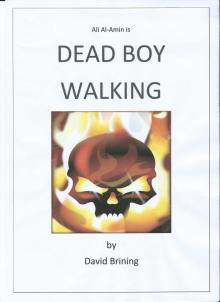 Dead Boy Walking
Dead Boy Walking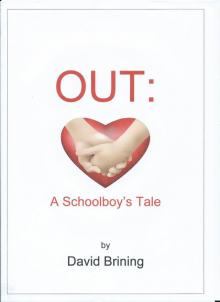 Out: A Schoolboy's Tale
Out: A Schoolboy's Tale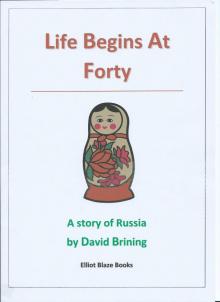 Life Begins At Forty
Life Begins At Forty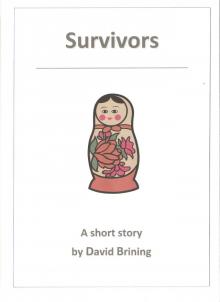 Survivors
Survivors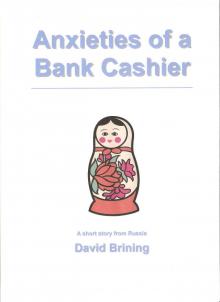 Anxieties of a Bank Cashier
Anxieties of a Bank Cashier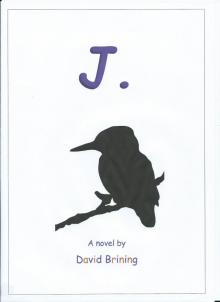 J.
J.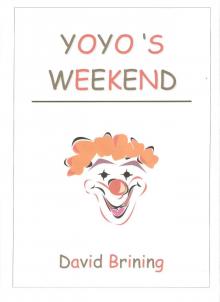 Yo-yo's Weekend
Yo-yo's Weekend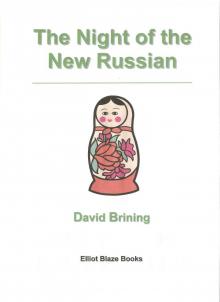 Night of the New Russian
Night of the New Russian